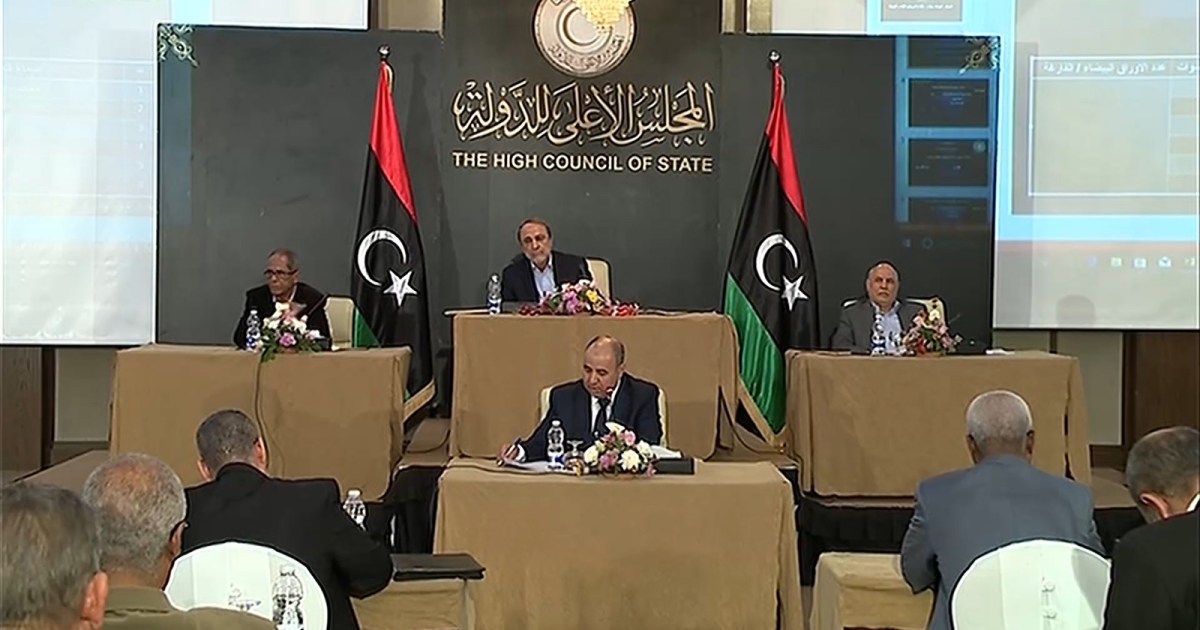54 members of the Supreme Council of State in Libya announced their rejection of the steps approved by the House of Representatives, represented in a constitutional amendment to choose Bashagha as a new prime minister, while Bashagha continues his consultations to form his government before returning to the House of Representatives to gain confidence.
And 54 members of the Supreme Council - out of 200 - issued a statement regarding the House of Representatives' decision on the tenth of this month to withdraw confidence from the Prime Minister of the Government of National Unity, Abdel Hamid Dabaiba, and assign Bashagha to form the government.
The signatories to the statement considered that the House of Representatives’ procedures to withdraw confidence from Dabaiba and his government were “void” because they violated the constitutional declaration and the political agreement signed in Skhirat, as there was no consensus between the House of Representatives and the Supreme Council regarding the withdrawal of confidence, and the withdrawal decision did not obtain the 120 votes required to withdraw confidence from Dabaiba government.
The statement added that "the procedure of withdrawing confidence does not include Prime Minister Dabaiba, given that his assignment was not from the House of Representatives."
Urgent |
54 members of the Supreme Council of State consider, in a statement to them, the procedures of withdrawing confidence from the government as a violation of the constitutional declaration and the political agreement, which renders it invalid. #Libya_Observer #Libya pic.twitter.com/6fDWaH9faN
— The Libya Observer (@lyobserver_ar) February 15, 2022
Al-Mishri's position
Today, Wednesday, the head of the Supreme Council of State (the highest advisory body), Khaled Al-Mashri, said that the parliament’s decision to assign Bashagha before holding an official session of the parliament is an “improper measure that does not help build bridges of confidence between the two chambers.”
The decision to withdraw confidence from Dabaiba threatens to return Libya to the division between two warring and parallel administrations that ruled from 2014, until the formation of a national unity government headed by Dabaiba last year under a peace plan backed by the United Nations.
Dabaiba said that he does not recognize the parliament's decision last Thursday to withdraw confidence from him, and that he will not step down, stressing that he will only hand over power to an elected government, and added that he will reveal at the end of this week a plan related to the election law and the date for holding them.
The Prime Minister of the National Unity Government added, the day before yesterday, Monday, that he would not allow what he called a "conspiracy" to extend the elections again, noting that the election train had started, and there was no turning back, as he put it.
On the other hand, the House of Representatives - which is based in the city of Tobruk (in the east of the country) - believes that the term of the Dabaiba government ended after the postponement of the elections that were scheduled for December 25, 2021.
Bashagha deadline
The House of Representatives gave Fathi Bashagha a deadline until February 24 to form his government and present it to a vote before the House, and the Prime Minister-designate began, on Monday, his consultations with various Libyan parties to form his government.
And the media office of Bashagha said, yesterday, Tuesday, that the Prime Minister-designate held consultations to form a government with members of the House of Representatives in the western region, with the head of the Supreme Council of State, members of the State Council, the President of the Presidential Council, Muhammad Al-Manfi and his two deputies.
Bashagha assured the Libyans that the process of handing over and receiving will take place in accordance with legal and constitutional mechanisms, and by peaceful means, according to his description.
"There will be no obstacles, especially since Dabaiba is a respected civilian figure, and he always calls for avoiding wars, and we are certain that he believes in democracy and the peaceful transfer of power," he said.
UN advisor
In a related context, the President of the High Council of State and the Special Adviser to the Secretary-General of the United Nations, Stephanie Williams, agreed, on Tuesday, the need for continued consultations and consensus among all political actors to maintain stability and end the transitional phase in Libya.
Yesterday, Tuesday, dozens of Libyans protested in front of the headquarters of the United Nations mission in Tripoli, rejecting the continuation of the work of the House of Representatives and the Supreme Council of the State, and demanded that electoral benefits be held and that members of the Council submit their resignations.
The US ambassador to Libya, Richard Norland, said, on Monday, that holding the elections in a timely manner is the best way towards what he called "a safe and united Libya." Reducing tension and respecting the will of the people.
Libya was scheduled to hold the presidential elections last December, but differences between political forces and state agencies over how to conduct them led to the collapse of the process days before the vote.
So far, no new date has been agreed upon for holding presidential and parliamentary elections, which the Libyans hope will contribute to ending the political instability in their country that has persisted since the fall of Muammar Gaddafi's regime in 2011.

